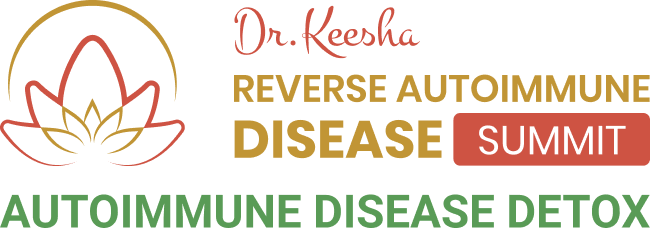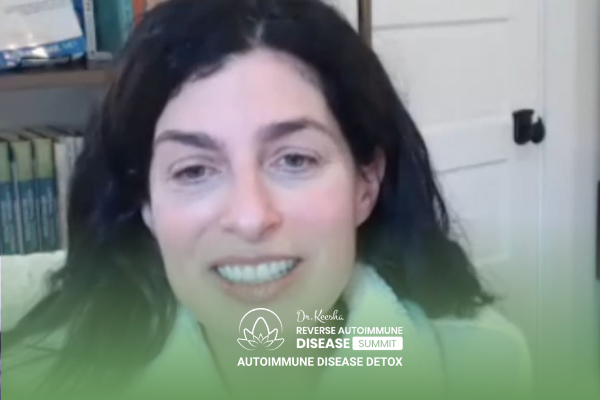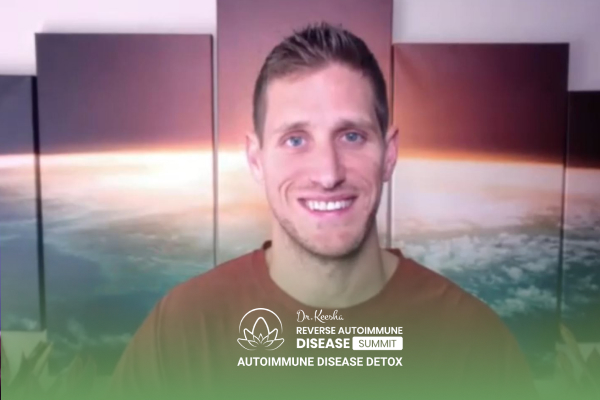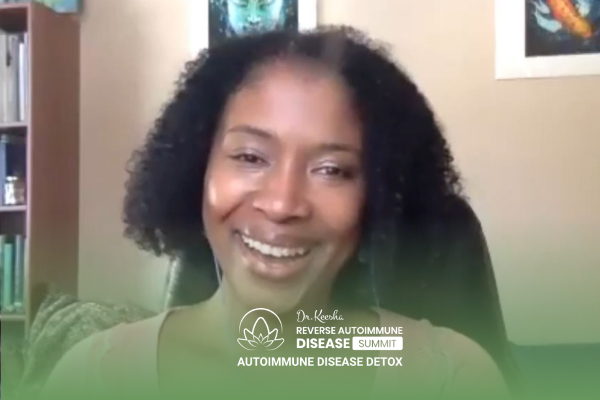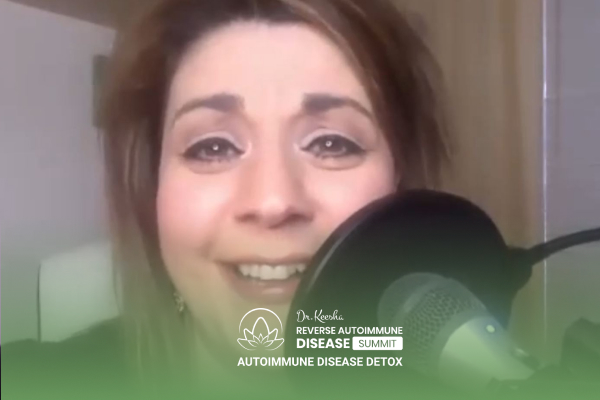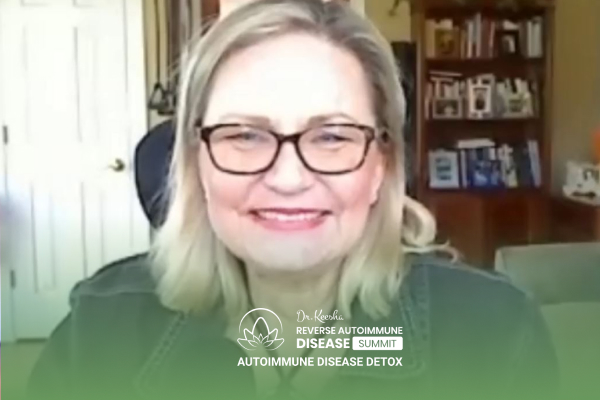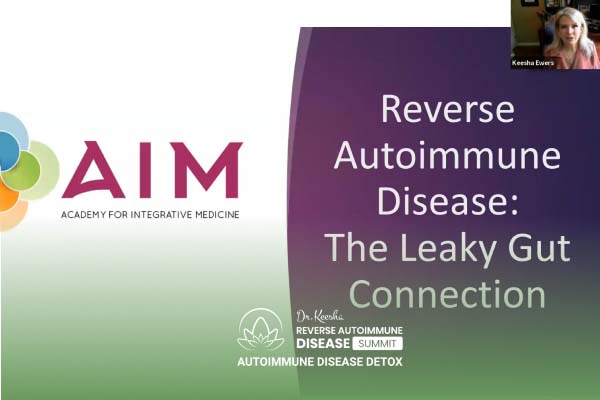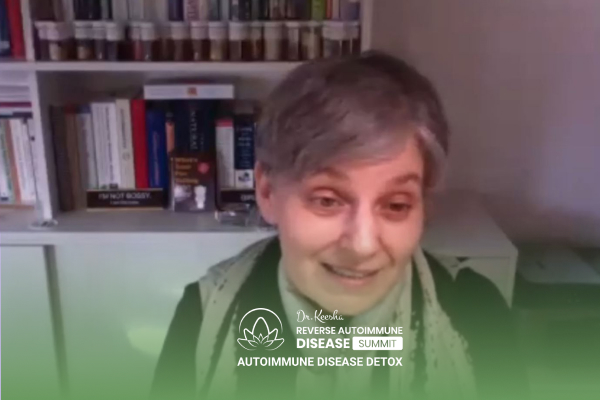Join the discussion below
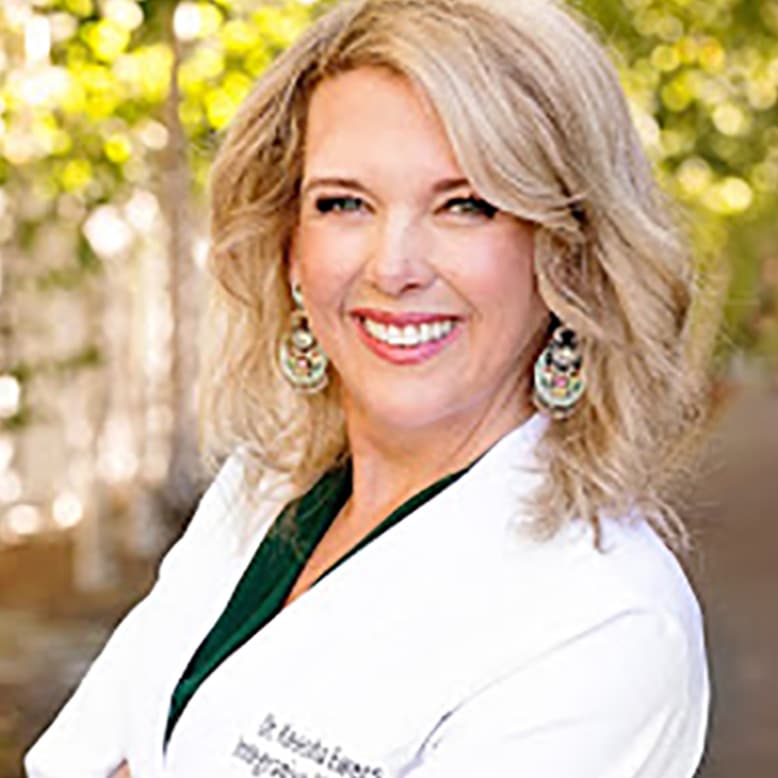
Keesha Ewers, PhD, ARNP-FNP-C, AAP, IFM-C
Dr. Keesha Ewers is an integrative medicine expert, Doctor of Sexology, Family Practice ARNP, Psychotherapist, herbalist, is board certified in functional medicine and Ayurvedic medicine, and is the founder and medical director of the Academy for Integrative Medicine Health Coach Certification Program. Dr. Keesha has been in the medical field... Read More
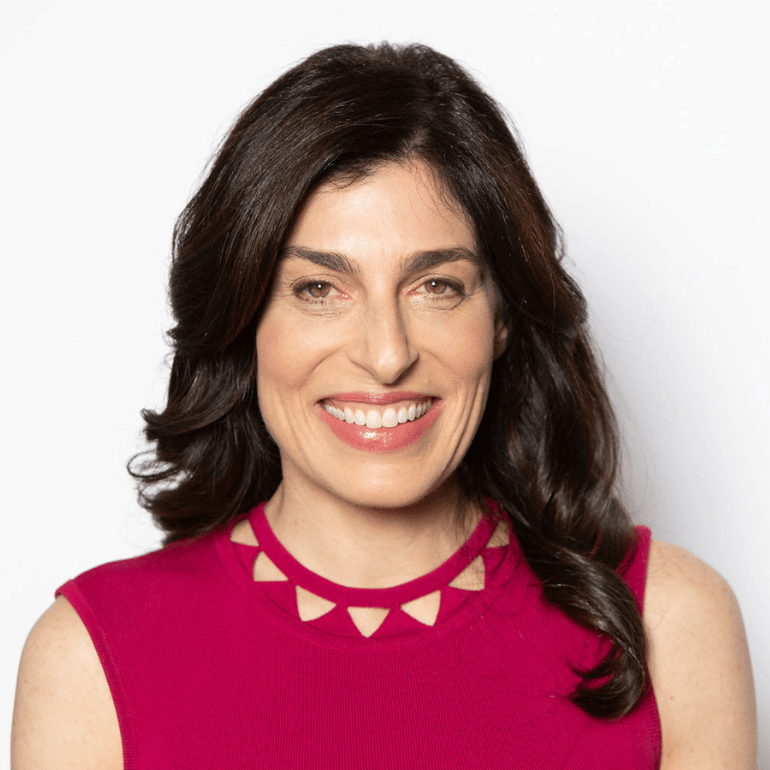
Blending science with soul, Dr. Keira Barr turns conventional methodologies on their heads so midlife women can feel comfortable in their bodies and love the skin they’re in Dr. Barr is a prominent leader in women’s medicine – creating a bridge between hormones, skin and mind-body medicine to optimize women’s... Read More
Join Dr. Keira Barr to uncover the different ways your skin can communicate with you to reveal important clues about your health.
- How to use mindfulness as a healing strategy and a diagnostic tool
- What your skin can teach you about your body’s toxic load
- How to read the “map” of your skin
Keesha Ewers, PhD, ARNP-FNP-C, AAP, IFM-C
Welcome back to the Reverse Autoimmune Disease Summit Series, everybody. Dr. Keesha here. And you are joining us for the fourth iteration of the Reverse Autoimmune Disease Summit Series. This is the auto-immune detox, of course. And we’re dealing with you as an individual, right? Or your own individual puzzle. And each puzzle has four corner pieces that we’re working with when reversing autoimmune disease. You have your own unique genetics. You have your own unique gut health. You have your own unique past trauma and how you manage your stress today. And then you also have your own unique toxic burden and your body’s ability to get rid of those toxins. And all of that stuff is unique to you. So there’s no one size fits all which is why the summit has really amazing experts coming in to talk about how you can read your body and what it’s trying to tell you. And of course, today is no exception. I’m delighted… To introduce you to Dr. Keira Barr, if you haven’t met her before. And she is a board certified dermatologist and we’re going to talk a little bit about what your skin is trying to tell you. And instead of, oh, my skin’s making me look old. Welcome to the summit, Dr. Barr.
Dr. Keira Barr
Thank you. I love that. Yes. Our skin can tell us many things. I always like to say that our skin can be our greatest cheerleader. So when we’re eating well, moving well, sleeping well like it’s going to glow and we’re going to love it but it can be a really crappy confidant. It will tell all your secrets which isn’t necessarily a bad thing. So gossip, in this case, could be really helpful.
Keesha Ewers, PhD, ARNP-FNP-C, AAP, IFM-C
Gossip is a way of conveying information. So it’s… This is exactly what your skin is trying to do. And this is one of the things I talk a lot about is the fact that your body, you know in the middle of an auto-immune crisis is not betraying you. It’s not trying to let you down. It’s trying to give you some information about the imbalances that it’s experiencing so that you can turn toward it, not away from it and say, okay you’ve been carrying me around all these decades. How can I support you better? You know, how can, how can I be of assistance to help you work the very best that you can? You’re an amazing, amazing blessing to me. And that’s a whole different mindset than I need to go get fillers and tucks to make my skin not look old. Right?
Dr. Keira Barr
Exactly. Exactly. And listen, I am not opposed to Botox and fillers. They have their place. In fact, you know, there’s some really good studies looking at Botox and depression and how it can be helpful. And for me though, it’s all about intentionality, you know from what, from what place are we pursuing these therapies? From the place of, I need to do this so that I can look younger, fitter, prettier, more attractive, feel more worthy versus I’m doing this because I feel good about myself. And I want my outside to mirror my inside. 100%.
It’s from that lens that you’ll get your return on your investment because this stuff is not inexpensive and it’s not permanent. You know, Botox is every three months. Fillers are, you know, once a year, once a year, year and a half, but when you do it from the other perspective, it’s more like window dressing. And so that trauma toxicity of our thoughts perpetuates and we know that the impact of stress on our skin is significant and it actually has a counter effect. It can break down that collagen and the elastin why you’re actually putting those fillers in is to kind of plump that and help, you know, rejuvenate and replace that appearance. And you might just be breaking it down. So.
Keesha Ewers, PhD, ARNP-FNP-C, AAP, IFM-C
That’s really good information. So let’s talk about, let’s back up just a little bit and talk about what are some of the signs that the skin is trying to give you, right? What is it trying to convey that we need to be alert and pay attention to when we’re talking about toxicity and maybe aging too quickly and breaking down faster than maybe we, we need to?
Dr. Keira Barr
Yeah. I love this question. And so, you know, my call to action, you know my background is that I’m a dermatologist and now the focus of my practice is working with women going transitioning to menopause and, and noticing you know, as our hormones are diminishing and there’s a lot like naturally declining but there’s a lot of things that can contribute that can create imbalances that exacerbate those symptoms. So one of the things that I always encourage people to do is I’m always about getting naked, right? We gotta like… Party in our birthday suit and that’s actually, you know… How we met. The… Most interesting first date I’ve ever had at the naked spa. I will never forget that. Totally made me walk my walk, get naked.
Keesha Ewers, PhD, ARNP-FNP-C, AAP, IFM-C
Dr. Barr and I actually met at the naked spa getting naked. She reached out to me- to the area and I said, oh, a halfway point would be this amazing spa, which at a time of COVID now you look back on and go what a gift, right? To be able to go spend time with other women in a spa like that, totally getting naked and getting body scrubs. I miss that.
Dr. Keira Barr
And that, and that was a first for me. So it was kind of like… Put your money where your mouth is, girl, if you’re going to talk about getting naked, oh you’re doing it. And the whole point is like, when we can get naked physically, right, and I always say, party in your birthday suit, you’re looking for uninvited guests, really a step-by-step from top to bottom, Palms, soles, looking at your intimate bits, looking at your skin for anything that’s growing or changing. And those can be clues that things may be out of balance, but we also need to get naked, you know, on the emotional and metaphysical level, because that is a lot of where these things that do show up on our skin that is the root cause of it. So things that we’re looking for, especially with regards to connecting the dots to our hormonal health women in particular, we may notice that our hair is thinning. That our hair, you know, our part is widening. And that has a lot to do with the imbalance between the decrease in progesterone and the relative dominance of your androgens, the testosterone. And…
Keesha Ewers, PhD, ARNP-FNP-C, AAP, IFM-C
Dr. Barr said relative, because this is an, this is an important word that she just used. You can have really low estrogen and be estrogen dominant because you have no progesterone.
Dr. Keira Barr
Yeah.
Keesha Ewers, PhD, ARNP-FNP-C, AAP, IFM-C
Yeah. You don’t have to have super super high testosterone or DATA to have this issue. It’s the balance and the ratio that she’s talking about when she says relative. So I think that’s a really important word to bring out.
Dr. Keira Barr
Yeah, no, I’m so glad that you said that and it’s true. I mean, starting in our mid to late thirties our progesterone is really dropping a precipitous rate in comparison to the estrogens and the androgen. So again, it’s that relative dominance of the other hormones, even though they are diminishing as well and progesterone plays an important role in modulating the effect that the androgens have on your hair follicles. So we know on the scalp that androgens can… The dihydrosome… Gonna back up, but… Testosterone is converted to a more potent form dihydrotestosterone by an enzyme five alpha reductase.
Progesterone… When it’s functioning at adequate levels it inhibits that conversion of the testosterone to it’s more potent form. I’m going to say DHT, ’cause it’s a mouthful. On the scalp DHT attaches to the hair follicles and can cause them to miniaturize so that the caliber and the thickness of the hair becomes smaller. And so what you notice is hair thinning; a decreased hair density. The opposite effect happens on the face. The DHT can actually stimulate those hair follicles which is where those, you know, coarse dark hairs on your chinny, chin, chin come from. So it’s-
Keesha Ewers, PhD, ARNP-FNP-C, AAP, IFM-C
All women love this.
Dr. Keira Barr
And so it’s that relative imbalance of like, oh, huh, I’m noticing my hair is thinning. I’m growing a bit of a beard. That’s a great clue. Number one, that there’s a relative imbalance. You could be more androgen dominant. Your progesterone levels could be low. Obviously there’s a lot of other factors that can go into it, but it’s clues like that. You’re like, huh? Ding, ding, ding, ding red flag. Like my, my hormones, there’s an imbalance there. And so, especially these are things that I’m encountering with the women that I’m working with. And then, you know, thyroid also plays a role in hair. So something about thyroid is lateral third of your eyebrows, increased hair shedding rather than just the hair thinning women are noticing a dramatic increase in hair shedding because your hair grows in three phases: a growing phase, a resting phase, a falling out phase.
And when you’re low in thyroid hormone, those hairs shift from the growing phase and resting phase more to that falling out phase, what we call a telogen effluvium. And when we can rebalance the thyroid hormone and give it the appropriate nutrients and oftentimes we do need to replenish, women notice that their hair, this, the shedding stops and then their hair begins to regrow. And granted… It’s not immediate. You know, these can take months and you may not even notice that you’re starting to shed for three, six months after what would be the inciting event. So I think, you know, your skin also it has its own rhythm, just like everything else. And so just to be mindful of that, it may take a little detective work. You know, you’re noticing the changes today, but really it, it stems back from three to six months ago when the event happened.
Keesha Ewers, PhD, ARNP-FNP-C, AAP, IFM-C
So, you know, the hormonal discussion that we’re having is so important and it has some more nuances that I’ve seen women that come to me that say, oh, my doctor put me on progesterone. And I gained five pounds in a week and I do not want to be on that. And you know, when, when that happens, when you gain weight when you’re put on something like that even though your testing is showing you’re deficient means your liver is not clearing it well. It doesn’t mean that you don’t need the hormone, it means that your organs of detoxification, livers hate hormones. So, you know it just means your particular liver is more congested. You probably need to do a little detox. That’s a sign. Doesn’t mean that, you know, your data says you’re low in progesterone but you gain weight that you don’t need the progesterone. It means that you need to figure out a way to work with it with your body and the form that you’re taking it in and the amount that you’re taking it in. So your body can actually work with you.
Dr. Keira Barr
I love that. And I think that’s so important. I hear that a lot too, that they started their bio-identical hormones and they gain weight. And they’re so frustrated. And again, we need to look at the whole picture that it’s not likely the hormones in and of themselves. It’s the environment in which we’re putting those hormones in and really addressing the whole, the whole picture and gut and liver health are so important and key part of that as well. For sure.
Keesha Ewers, PhD, ARNP-FNP-C, AAP, IFM-C
It’s interesting that weight gain and hair loss are two of the primary things that women will sit up and pay attention to and be like, okay what are you trying to tell me here? You know, I need to really, really focus. And so, you know, they’re both just pieces of information that your body’s trying to give you that you know, you’re not failing. It’s just, oh yeah, it is good to sit up and ask questions and you know, not so much, how do I lose this immediately but why is this happening and how can I assist you? Right?
Dr. Keira Barr
I love that. And I think unfortunately because our skin and hair are the most visible and society, you know it’s a $500 billion plus beauty industry. This may not be popular opinion but they’re marketing to us saying that we’re broken that there’s something wrong with us. That it’s, it’s called, you know, chem, like cover up, make up. We are, we are made to feel as though there is something wrong. And so when we see these signs, you know we interpret it as there’s something wrong with us we’re doing something wrong that we’re maybe unlovable, unworthy, not attractive, and it can be incredibly damaging. So not only is your body giving you clues that it needs some support, maybe some liver support or, you know, stress management. And especially when you’re carrying weight around the middle, but it’s also now creating some toxicity in your mindset and your thoughts and it becomes a perpetual cycle. And it’s something that I personally struggled with.
You know, I was made fun of as a kid for what was on my skin and had a lot of skin shame and a lot of body shame and all the things, cause I thought, well if people didn’t like what was on my skin then they don’t like me. And if they think that what’s on my skin is not pleasing then I must not be pleasing. So I spent so much of my life trying to be a people pleaser. And it wound me in a position of having to diagnose myself with melanoma as a skin cancer specialist at the time which is devastating and hormonal complete hormonal imbalances that lead to, you know bloating and anxiety and migraines, ultimately leading to a hysterectomy because my doctors never looked at my whole picture and said, hey, you have a hormone imbalance.
Let’s help you and replenish and support. And that’s why I’m so committed to talking about this and so grateful for this opportunity because you know my mass has become my mission to help other women understand that what is showing up on their skin are truly opportunities to help support our body and how, you know what’s showing up on our skin says a lot about how we are showing up in it from a place of lack of, you know self-worth self-esteem and that’s going to show up in a myriad of different ways. So it’s so vital. And I’m just so grateful that you have created this because there are many facets to auto-immunity and toxicity, right? It’s not just what we put on our plate. It’s not just what we put on our body with our skincare products. A lot of it has to do with like, what is happening up here and that can play out on our skin significantly.
Keesha Ewers, PhD, ARNP-FNP-C, AAP, IFM-C
It’s so true. And since we’re on the subject I had a basal cell carcinoma, several, I think 25 years ago at this point. And you know, I, I found it and went in and had it checked. Let’s talk about the staging of what that means. What someone like you is looking for when you go in for your yearly. And I hope all of you are doing this going in for your yearly skin exam so that, you know, you’re going head to the bottoms of your feet to make sure that there’s not something going on with your skin that is trying to tell you. So can we talk a little bit about skin cancer?
Dr. Keira Barr
Yeah. Absolutely. So in full disclosure now my practice is a hundred percent virtual dealing with menopause and bio-idenal hormones. So I’m not… So I’m referring to my colleagues but it’s something I’m so passionate about because skin cancer is the most prevalent cancer in the United States and in other countries around the world. So it’s the most prevalent, the most preventable and the most-
Keesha Ewers, PhD, ARNP-FNP-C, AAP, IFM-C
And the least talked about.
Dr. Keira Barr
And the least talked about. And so there’s so much that we can do. So that’s why I always say on the date of your birthday, right? It’s easy to remember once a month, you’re getting naked and you’re checking your skin, looking for uninvited guests. And when it comes to skin cancer, there are two types. There’s the melanoma. And then the non-melanoma. Basal cell carcinoma squamous cell carcinoma. And there’s a few more like Merkel cell carcinoma which is more rare, but also more dangerous but squamous and basal cell and the most common. What you’re looking for there are spots that are, you know, growing, changing. It’s that pimple that just won’t go away. You try and squeeze it, nothing comes out. And it has maybe oftentimes like a little translucent kind of a pearly poplar, or it can be red and scaly and you keep trying to scrape it off. It may go away, but then it comes back. So though, and something that bleeds spontaneously bleeds, those are clues, not necessarily an automatic diagnosis that something is wrong but those are the kinds of-
Keesha Ewers, PhD, ARNP-FNP-C, AAP, IFM-C
Red flag.
Dr. Keira Barr
Red flag. Bring to your dermatologist to have them check you. I had a woman, she snapped a photo. She’s like, I’ve got this rash and it just won’t go away. I’m like a girlfriend, that is not a rash. It’s been there for over a year. That’s a basal cell carcinoma. And the good news is… Basal cell carcinomas are the most common type of skin cancer. And they are the most easily treated. There are different patterns underneath the microscope. So my subspecialty was dramatic pathology. So I looked at skin on the surface and below it which I think is why I’m so fascinated now with you know, physically, emotionally like what is on the surface. And I never connected the dots before, but… But so there are different modalities for treating it.
Sometimes it can be, we do something called scraping and burning or electrodesiccation and curettage or surgery, or there’s staged surgery called Mohs surgery all done under local anesthetic. So your dermatologist can walk you through those options. But the key thing is getting to know your skin inside and out. So when it comes to melanoma type of skin cancer which is the most deadly this is where we’re talking about the pigmented lesion like the moles that are on your skin. Sometimes they can be pink. What we call a melanomic melanoma. And really what you’re looking for is, you know going back to, you know your kindergarten nature, A, B, C, D, E, Fs. So things that are asymmetric. So if you were to cut a spot down the middle it should be the same on both sides. You want something that has a discrete distinct border, sharp edges, C is for color.
You want it uniform in color. Your red flags are when something is multiple colors or changing in color with the caveat that knowing your skin some of us have signature nevi, where like I have… They’re smooth brown. And then at the periphery, I have like a little dot. And so I have multiple that look like that. So for me, that’s like my, like my normal, right? It’s getting to know your own skin. D is for diameter. And so we always talk about smaller than a pencil eraser but that’s a really soft call. ‘Cause melanomas can be very small. So it’s, it’s there. If you’ve got one that’s bigger than a pencil eraser when all your others are tiny obviously that’s the one that you want to get checked out. E is for evolving, something that is changing over time which is why getting naked every single month consistently is so important. An F stands for funny looking. It’s really that ugly duckling, the one that stands out from your crowd which is why it’s so important to get to know your skin.
And when I say get to know your skin, I mean all of it: recruit your hairdresser to look in your scalp, recruit your optometrist, ophthalmologist, to look in your eyes because melanoma can occur there. In your mouth. Get your dentist, have your manicurist. When you get your mani-pedi, I know it’s maybe not as common now in COVID, but, but I know that I’ve seen so many women who are still going to the nail salon, before you get that polish change check your fingernails and your toenails ’cause melanoma can occur there too. And then your intimate bits: how many women do I know who’ve never looked at their vulva? Like ladies get familiar for so many reasons for vaginal atrophy and looking for signs of change. As we transition to menopause.
Keesha Ewers, PhD, ARNP-FNP-C, AAP, IFM-C
I just had two skin tags cut out from my vulva hat that I found when I was washing in the shower and said, oh, these are new. And they started, they were growing over months. And I thought, okay, it’s time. And I went in and I had them cut. And you know, pathology looked at them and said, oh you have this ancient form of HPV on this one. You know, that that’s like, primordial is what they called it. That’s important to know. That’s really important to know. Right? So, you know, don’t ignore these things. Don’t ignore them.
Dr. Keira Barr
And as we mature, you know, we’ve had life lived, there are-
Keesha Ewers, PhD, ARNP-FNP-C, AAP, IFM-C
Just went through menopause, so yeah. That’s all since then. Yep.
Dr. Keira Barr
In between your fingers, bottoms of your feet, you know, no… No stone unturned. Look at every inch of your skin. And especially as we mature there are so many changes that happen as our hormones decline, you know, certainly estrogen you know, your facial skin, you may notice more fine lines and skin sagging because estrogen plays a significant role in collagen formation and production of that hyaluronic acid. We were talking about fillers, well, estrogen is, plays a large role in producing that naturally for us. So as estrogen declines you’re not going to have that plump and supple appearance. You’re going to notice the skin sag, but your vaginal skin, that vaginal dryness that pain during intercourse that, hmm, why am I getting so many more UTIs? Because the vaginal tissue is atrophying. And then there can create some irritation with the urethra. And so all of this, all of these are just clues that, hey, I need a little support. You know? And the amazing thing is that we have the power to take control of our health and do something about it.
Keesha Ewers, PhD, ARNP-FNP-C, AAP, IFM-C
So what about the skin… This skin, things like actinic keratosis, you know I noticed that a lot of women come to me after while they’re in the middle of menopause perimenopause menopausal that are saying I have these weird things are happening on my skin. We mentioned skin tags, but what about some of like hard bumps and things like that? Why are those occurring now? What can people do?
Dr. Keira Barr
Absolutely. This is a great question. So actinic keratosis is a precursor to the type of skin cancer called squamous cell carcinoma. So just because you have an actinic keratosis does not mean you automatically will develop skin cancer but it’s evidence that you’ve had enough sun exposure over your lifetime to create the, the damage to the skin, the DNA damage to generate these rough spots. They feel like sandpaper. Sometimes you can feel them better than you can see them. And so why does this happen? Well, we know it’s, it’s cumulative exposure over your lifetime. 90% of physical signs of aging are from sun exposure. So…
Keesha Ewers, PhD, ARNP-FNP-C, AAP, IFM-C
Baby oil and aluminum foil and sunning in the hair. Gosh, if I could go back to my younger self and say, stop that.
Dr. Keira Barr
I know. Me too. Me too. I mean, I’m a brunette, but my dad’s a redhead and I just fried and I lived on the east coast. So we would just go down to Florida. My grandparents lived down there. I would just fry.
Keesha Ewers, PhD, ARNP-FNP-C, AAP, IFM-C
Yeah. Of course it always turned into a beautiful tan. So why not hurry it up with the red first?
Dr. Keira Barr
Totally. I, oh my gosh, we are wiser now. And we can, it’s never too late. So what can you do? So many things. So, you know, I always say that sunscreen should be one of your friends, but it is not your BFF. So SPF is not your BFF but it can be part of your inner circle. And it’s something that we should use on a daily basis. I mean, I’m indoors, right? We are, most of us are working at home with COVID but I’m sitting in front of a window and UV light is made up of UVA. UVB, UVC, UVC is the most dangerous but doesn’t really penetrate the stratosphere. So we don’t have to worry about it as much. UVA is the longest wavelength. We call it the aging ring and it can penetrate through window glass.
So even if you’re working at home and you’re working indoors having some layer of some protection is important because you are getting exposure if you’re sitting in front of the window, not only that we’re sitting in front of our devices. And so recent studies have shown that blue light can also impact our collagen and our elastin, and may contribute to pigmentation. So using a tinted moisturizer and oxides, yes. So protecting your skin from the outside is important but really nourishing yourself from the inside out is where it’s at because what creates the damage is oxidative stress it’s stress. It’s stress that the body… Doesn’t know how to deal with it when it’s overwhelmed.
I mean, your skin has its own antioxidant system built in but because we’re exposed to the sun every day, air pollution every day those resources get used up pretty quick. So we can replenish them. Yes, they’re topical antioxidants, but also how what you put on your plate is really important. So eating a diet that’s plant forward rich in phytonutrients, you know, some of the great ones that have gotten a lot of good research behind them, pomegranate, you know our omega three fatty acids, you know, green leafy veggies like all the things to make your plate as colorful as possible, actually benefit your skin quite a bit. And then there are just like going off, I just love sun protection, but there are actually some curated supplements that can be helpful like niacinamide is one. Vitamin B3… Has been shown in the literature for those individuals who’ve had a history of skin cancer, squamous cell carcinoma 500 milligrams twice a day actually can decrease the risk of future, but only in those individuals who’ve had a history. So yeah.
Keesha Ewers, PhD, ARNP-FNP-C, AAP, IFM-C
That will also interfere with methylation if you’re on a methylated form of B12 and folate. So that’s interesting. You’re going to have to also get your methylmalonic acid checked when you’re doing you know, niacinamide, because then you want to make sure you’re getting both. So that interaction that’s 500 milligrams is what we do to treat you if you’re over methylating. So yeah. It’s interesting.
Dr. Keira Barr
It’s a delicate balance. And again, it’s… Knowing your body and tuning in. So like if you’re entered, you were feeling great and energy and all of a sudden, you know, things are shifting and you’ve started to take a supplement, you know, so but niacinamin could also be used topically but the studies have shown, and again this is traditional medicines, but they weren’t looking at methylation or anything like that. So they were looking but the studies were promising.
Keesha Ewers, PhD, ARNP-FNP-C, AAP, IFM-C
Yeah. And, and the other thing about using anything topically, you know, is both of us are here to say you’re eating it. So that’s another, as we’re talking about detoxification if you can’t eat what is on your label then it’s actually going into you. So we give hormones… So, you know, topically, we give scopolamine patches we ha you know, pain medication as patches which means that your skin absorbs it and you’re eating it. So that Off! bug spray, you know might as well just open your mouth. Spray it on in there.
Dr. Keira Barr
And the other thing that’s spray sunscreens I’m not a big fan of spray sunscreens either number one ’cause of the aerosolization like who knows, you know, but you’re also you still have to rub it in. So you might as well just use one that…
Keesha Ewers, PhD, ARNP-FNP-C, AAP, IFM-C
Yeah.
Dr. Keira Barr
Yeah.
Keesha Ewers, PhD, ARNP-FNP-C, AAP, IFM-C
Yeah. And then, so there’s also that dance between sunscreen and vitamin D, right? ‘Cause we live in an area in the Pacific Northwest where people are chronically low in D although that’s showing up in Key West Florida because we’re such indoor creatures now especially with COVID. So making sure that you’re keeping your vitamin D levels between 75 and 90 as you’re using your skin sunscreen. So you’re supplementing with as much as you need to keep that level where it needs to be while you’re also, you know, screening your skin from harmful UV rays that can cause cancer. So yeah.
Dr. Keira Barr
Same one with vitamin D just because most people, they’ve done surveys. Most people don’t put on the recommended amount of sunscreen. So the amount that sunscreen may be interfering with vitamin D is probably overestimated because the vast majority of us are not putting on the recommended amount. So I think it may, and now they’re actually looking at creating sunscreen that have kind of, have a vitamin D filter. So hopefully we will not have to worry about that as much. But that being said to your point I think no matter where you live in the world it’s always important to check your vitamin D levels. Most of us are gonna have to supplement.
Keesha Ewers, PhD, ARNP-FNP-C, AAP, IFM-C
Yeah.
Dr. Keira Barr
Yeah.
Keesha Ewers, PhD, ARNP-FNP-C, AAP, IFM-C
Yeah, and I have to say, I am guilty. I am an under sun-screener. I make it myself. And when I know, I mean I got fried three years ago going skiing in Utah and I forgot my sunscreen and I was just toast, you know I mean just crispy, lobster red and just crying. Oh my God. You know, I know better than this. Right? And so it’s, I think that I don’t wear foundation. And so I think that some of the makeups these days like there’s mineral makeup with sunscreen in it you can get all kinds of formulated things that have got the sunscreen in it that if you’re wearing that kind of thing it’s so helpful to just have it on as a matter of, you know, you’re, it’s just there. You don’t have to think about it right?
Dr. Keira Barr
Yeah, exactly. I think I’m all about simplicity. I am… Probably the least compliant physician. I am, I keep it simple. My skincare routine is like three steps. And if you can multitask, that would be great. And your point about, you know, skiing the sun is reflecting off the snow and at elevation the intensity increases by a percentage for every thousand feet of elevation. So it’s kind of like this double whammy. So for sure when you go skiing or when you’re on the water and we are blessed to be in the Pacific Northwest where we have water all around but you will get more sun exposure. So it’s just something to keep in mind.
Keesha Ewers, PhD, ARNP-FNP-C, AAP, IFM-C
I was just sick. I mean, my 16 year old would have been so happy, but my you know, my 53 year old was just like, oh no, you know? And I remember falling asleep after I took a group to Peru and we were on Lake Titicaca, you know the highest Lake in the world fell asleep on a boat as we were going to another Island with my face up, and again, tomato burn, you know? So it’s just being really conscientious and mindful. And I am probably the least when it comes to that. I mean, I’ve demonstrated that over and over again. So I would just say to everybody… Please. Make it one of those things that you carry with you like your phone, you know, that you just have it. So.
Dr. Keira Barr
Yeah. And I think, you know, it just gets harder as we mature as well, because we’ve had a lot of exposure. Our skin may not be as resilient especially as our hormones are diminishing. We, you know, the pH of our skin changes and it makes us more vulnerable to sensitive, sensitivity, irritation and stuff. So whatever we can do to bolster that this is our ultimate barrier both physically as well as, you know, it’s our boundaries. I always like to, you know, it’s a metaphor for everything. This is our boundary for our relationships, our communication, all the things. And so we have to protect it. We have to reinforce that.
Keesha Ewers, PhD, ARNP-FNP-C, AAP, IFM-C
Thank you so much, Dr. Barr, is there something that we didn’t talk about when it comes to auto-immunity detoxification in the skin that you wish we had talked about that you want to say as we end?
Dr. Keira Barr
Okay. Well… There’s so many things especially with certain autoimmune conditions, there’s-
Keesha Ewers, PhD, ARNP-FNP-C, AAP, IFM-C
Rosacea.
Dr. Keira Barr
And lupus and things but I think the most important thing is just get familiar with yourself and, you know I’d love to help women just reframe what they’re seeing as information and as a way for you to be able to support yourself rather than something’s going wrong, or to not view your your skin from a point of criticism or contempt rather of gratitude, of oh wow. I see this now. It’s an opportunity to ask, like what do I need right now? What do I need the most right now? How can I support myself? And from a place of self-compassion and self-love because that’ll go a long way. I know with my women that I’m helping with their transition to menopause, like there’s a lot of stuff to unpack and we’ve, we’ve gone through a lot. And I think that’s one of the biggest things is how we see ourselves.
Keesha Ewers, PhD, ARNP-FNP-C, AAP, IFM-C
You know, I actually came up with my last question and that was rosacea. Why does minocycline work? And is it the right choice?
Dr. Keira Barr
So it’s really interesting. So again, like… Putting on my dermatology hat back on, I’m not actively managing you know, rosacea and such, but minocycline works. And we use it at oftentimes lower doses than for true infection because there’s an anti-inflammatory component. So we know that rosacea, you know is an inflammatory skin condition. And the more that we look into it, looking from a more integrative approach, there’s a gut component. So that gut skin connection is, is key. So looking at gut health, but from, for the minocycline it has a lot to do with its ability to modulate the inflammatory response.
Keesha Ewers, PhD, ARNP-FNP-C, AAP, IFM-C
Okay.
Dr. Keira Barr
That’s why it’s used.
Keesha Ewers, PhD, ARNP-FNP-C, AAP, IFM-C
So, and there are other things that you can do to reduce inflammation, you know because at the end of the day it’s not that you’re deficient in an antibiotic, you know?
Dr. Keira Barr
Correct.
Keesha Ewers, PhD, ARNP-FNP-C, AAP, IFM-C
Yeah. It’s hard when things like Accutane works so well for acne or minocycline works so well for rosacea to not be seduced by that, you know, instant it is kind of instant gratification. It clears up pretty quickly, but at the, you know at when the whole story is told and you finally look at the entire picture those things are doing a tremendous amount of damage in the process. So yeah.
Dr. Keira Barr
I, yeah, it’s, it’s interesting. You know, I know that there’s a camp that’s very anti Accutane, but I can tell you when I was treating especially teenagers, it was life.
Keesha Ewers, PhD, ARNP-FNP-C, AAP, IFM-C
I took two rounds of it, you know, 18 and 19. And when I look back, I go, oh now I know why my body was trying to tell me and why I had acne. And Accutane was like, oh wow. And that’s why I did it again. But I have a feeling it contributed to some of the toxic burden that my liver had to deal with later when I was diagnosed with rheumatoid arthritis, you know, it’s just like, okay, that acne was one of the steps along the path to RA that was trying to give me information and I just went and covered it up, you know and it did make a big difference and it was life changing for my self-confidence in that moment in time. So yeah, I’m definitely not coming down on any camp that like, this is bad and this is good. It’s just looking at that entire dynamic and the whole picture and having compassionate curiosity for what’s going on and what the body is trying to say. So.
Dr. Keira Barr
Yeah, absolutely. And it’s so interesting connecting the dots going backwards right? Like those were-
Keesha Ewers, PhD, ARNP-FNP-C, AAP, IFM-C
Yes. So much easier.
Dr. Keira Barr
Right. I mean, I was the same way. I was just masking stuff up left and right. And thankfully in many ways, like, thankfully I was diagnosed with skin cancer. It’s not what a dermatologist wants, but that was like a tip of the iceberg for all the other stuff happening. And it was just a wake up call. Like for me, it was stress. It was the physical stress of overexercising of not giving my body the nourishment that it needed thinking I was eating healthy but that really wasn’t healthy food. And then, you know, the emotional drain.
Keesha Ewers, PhD, ARNP-FNP-C, AAP, IFM-C
For me, it was a lot of my past childhood trauma, you know which I would have never investigated had that not happened. Ever.
Dr. Keira Barr
No. So again, it’s painful sometimes but like, they’re gifts. They are gifts.
Keesha Ewers, PhD, ARNP-FNP-C, AAP, IFM-C
Thank you so much.
Dr. Keira Barr
Yeah, thank you. Super fun.
Keesha Ewers, PhD, ARNP-FNP-C, AAP, IFM-C
We have Dr. Barr’s information and I believe you have a free gift for our viewers?
Dr. Keira Barr
Yes. In terms of helping to bolster your skin from the inside out and, and help you fight off some of that UV damage, there’s a glowing skin guide. So all, all, all the nourishment that you could think of to help make your skin more resilient.
Keesha Ewers, PhD, ARNP-FNP-C, AAP, IFM-C
Beautiful. Thank you so much for spending this time with us and sharing just even a fraction of your wisdom. It’s deeply appreciated. All right, everybody until next time, be well.
Dr. Keira Barr
Bye.
Downloads
